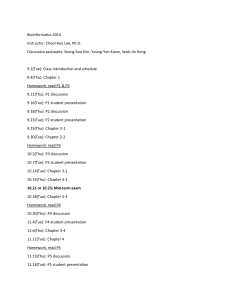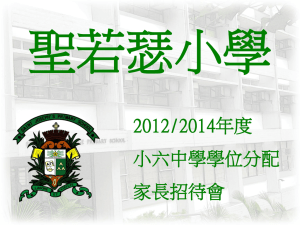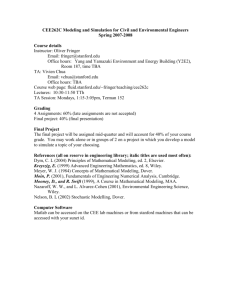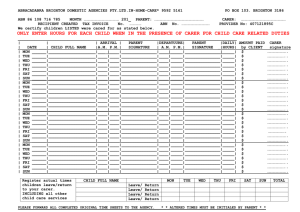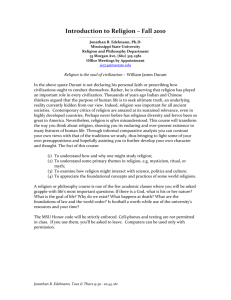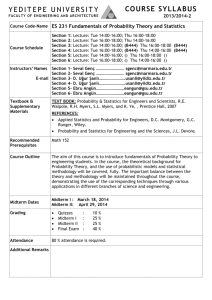Syllabus - Florida Atlantic University
advertisement
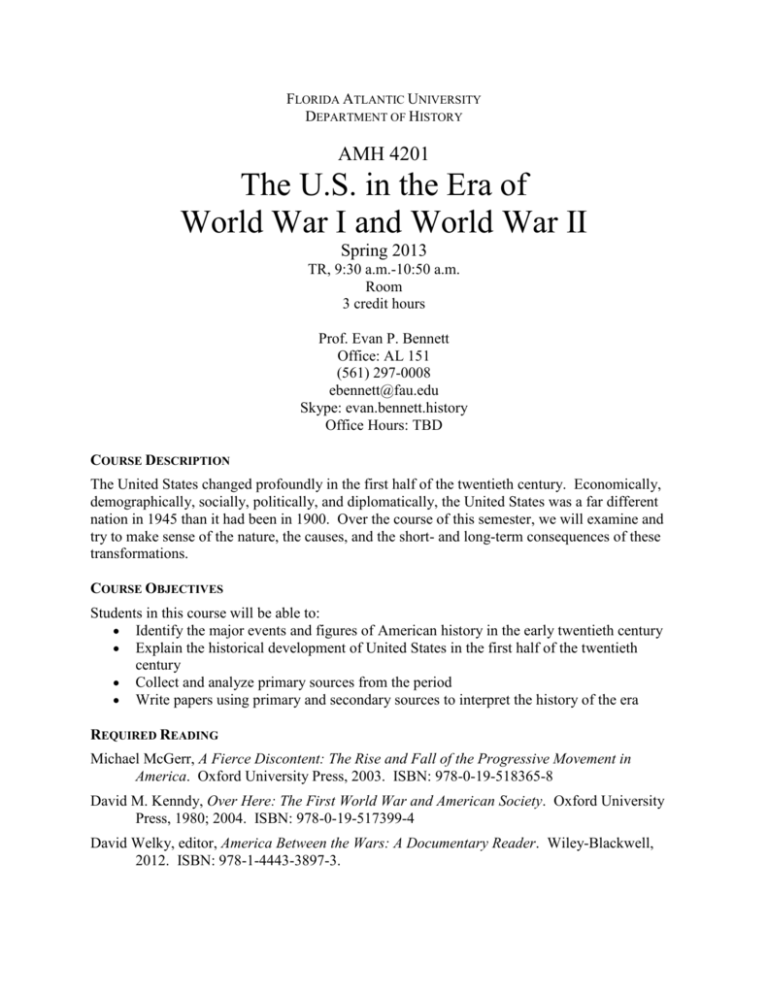
FLORIDA ATLANTIC UNIVERSITY DEPARTMENT OF HISTORY AMH 4201 The U.S. in the Era of World War I and World War II Spring 2013 TR, 9:30 a.m.-10:50 a.m. Room 3 credit hours Prof. Evan P. Bennett Office: AL 151 (561) 297-0008 ebennett@fau.edu Skype: evan.bennett.history Office Hours: TBD COURSE DESCRIPTION The United States changed profoundly in the first half of the twentieth century. Economically, demographically, socially, politically, and diplomatically, the United States was a far different nation in 1945 than it had been in 1900. Over the course of this semester, we will examine and try to make sense of the nature, the causes, and the short- and long-term consequences of these transformations. COURSE OBJECTIVES Students in this course will be able to: Identify the major events and figures of American history in the early twentieth century Explain the historical development of United States in the first half of the twentieth century Collect and analyze primary sources from the period Write papers using primary and secondary sources to interpret the history of the era REQUIRED READING Michael McGerr, A Fierce Discontent: The Rise and Fall of the Progressive Movement in America. Oxford University Press, 2003. ISBN: 978-0-19-518365-8 David M. Kenndy, Over Here: The First World War and American Society. Oxford University Press, 1980; 2004. ISBN: 978-0-19-517399-4 David Welky, editor, America Between the Wars: A Documentary Reader. Wiley-Blackwell, 2012. ISBN: 978-1-4443-3897-3. Lizabeth Cohen, Making a New Deal: Industrial Workers in Chicago, 1919-1939. Cambridge University Press, 1990. ISBN: 0-521-42838-6 Paul Fussell, Wartime: Understanding and Behavior in the Second World War. Oxford University Press, 1989. ISBN: 0-19-506577-8 COURSE REQUIREMENTS Attendance Class attendance will be taken daily. Students may miss up to two class meetings without penalty (except as outlined below). Each absence over two will result in the deduction of one point for each absence. Any quiz, test, or in-class assignment missed because of an unexcused absence will be counted as a zero. In the case of out-of-class assignments (e.g. paper assignments), students who turn in the assignment on time but fail to attend class on the due date will suffer whatever late penalties would have been incurred if the assignment had been turned in one day late. In the case of excused absences, students must e-mail the professor to convey the dates of any excused absences known ahead of time. Any student seeking an excused absence must contact the professor within 24 hours of the absence. Absences caused serious illnesses, personal emergencies, and college business only will be considered excused. An excused absence does not mitigate the student’s responsibility for completing assignments or performing acceptably on them. In the case of all absences, you are responsible for catching up. Writing Assignments 1. 1920s Newspaper Assignment – Advertising came of age in the 1920s. The decade’s widely noted consumerism was both a product of and a contributor to artistic and economic revolutions in the use of visual arts to sell things. Your assignment will be to examine the advertisements in a week’s worth of either the New York Times or the Los Angeles Times and write a 3-page paper that examines three of these advertisements in light of the larger culture of the 1920s. Detailed instructions will be distributed separately. 2. The Local Depression Assignment – Ever since its own time, people have called the economic downturn following the stock market crash in 1929 the “Great Depression.” Despite its national scope, the economic hard times of the 1930s struck Americans on a local, even personal, level. Your assignment will be to choose one town, city, or county in the United States and write a research-intensive paper (4-5 pages) that explores that location’s experience during the Great Depression. 3. Radical Pamphlets Assignment – Florida Atlantic University is the proud owner of a large collection of original pamphlets published by labor, socialist, and other radical political groups, as well as some published by opponents of these organizations. The pamphlets span the twentieth century. Fortunately, the university has digitized most of them and placed them online. Your assignment will be select one pamphlet produced during the time period covered by this class (1900-45) and write a 2-page paper that both contextualizes and analyzes it. Detailed instructions will be distributed separately. All writing assignments must be submitted in hard copy on the date due. Failure to conform to the preparation instructions detailed in the attached writing guide will result in reduction of the grade for the paper as indicated in the assignment rubric. All papers will be also submitted through SafeAssign on Blackboard. Papers must be submitted electronically before the start of classes on the day the assignment is due. Late papers will be reduced by one letter grade for each 24-hour period overdue. Extensions of a paper due date will be granted only in the event of a documented medical, university-related, or emergency event and only in advance of the paper due date. Exams There will be one in-class exams and a final exam this semester. They are scheduled for the following dates o Midterm Exam – TBD o Final Exam – TBD Study guides will be distributed roughly two weeks prior to each exam. GRADES 1920s Newspaper Assignment Local Depression Assignment Radical Pamphlets Assignment Midterm Exam Final Exam Total 20 points 20 points 20 points 20 points 20 points 100 points All letter-graded assignments (i.e. the writing assignments) will be weighted with the percentages used by the Blackboard Grade book: A=95%; A-=91.5%; B+=88.5%; B=85%, etc. Following is the scale for determining final grades. Grade A A- Points 93+ 92-90 B+ B B- 89-88 87-83 82-80 C+ C C- 79-78 77-73 72-70 D+ D 69-68 67-60 F <60 Appropriate rounding will be considered when calculating grades. I am more than willing to discuss your grade with you in person. However, any request for a grade change must be made in writing and include a detailed rationale of why the grade should be altered. I rarely, if ever, offer extra credit, and will, under no circumstances, provide alternate assignments, so please do not ask. Course Policies 1. Class Climate: During lectures, I encourage both questions and comments because these often offer wonderful opportunities to explore the course material in ways that you find interesting or in ways I may not have considered. However, please understand that we have only so much time in the semester; if a discussion, no matter how interesting, deviates too far from the topic at hand, we’ll have to table it and move on. At the same time, in order to make sure students are comfortable participating, we will create and maintain an atmosphere of mutual respect in which everyone’s ideas and questions can be heard. 2. Cell phones: Please turn off or silence cell phones when you enter the classroom. Please show common courtesy and do not send text messages, use Facebook, or use with any other applications during the class. 3. Technology: Students are to use technology in the classroom only so far as its use relates to the class. 4. Tardiness: Students are expected to arrive on time for each class meeting. If you arrive late, please enter the room quietly. 5. Seating: The instructor reserves the right to limit seating to certain areas of the classroom. 6. Communication: There are several ways we will communicate in this class. a. FAQ Wiki: This wiki is used for general questions about the course. If you have a question of a general nature about the course (e.g. due dates, how to access something, etc.), please check here first. The professor or teaching assistants may respond, as might other students. This should be your first stop. b. Announcements: The professor will communicate any important updates to the course through Blackboard’s Announcements tool. These will be visible on the course’s main page, and you will also receive an email in you FAU account. c. Blackboard Messages: All personal communication with the professor or teaching assistants must be made through the Blackboard Messages tool, not through the FAU email system. This is to ensure that your messages are received in a timely manner. Please allow 24 hours for the professor to respond, and do not expect a reply on weekends. d. Email: Emails to professor’s FAU account should be sent only in case of a real emergency. e. Phone: I will be available by phone during office hours, provided I am not meeting with anyone at that moment. If you call and are turned over to voicemail, please leave a message with a contact number and a best time to call you back. My office number is 561-297-0008. You may also reach me through Skype: evan.bennett.history 7. Wikipedia: Wikipedia and other open source information sites are not reliable enough for scholarly research and are thus not appropriate for use as a source in a formal history paper. Students in need of general information are encouraged to use a standard, reliable encyclopedia. The FAU Libraries maintain a subscription to Britannica Online, which provides full access to Encyclopaedia Brittanica both on campus and off campus through Off Campus Connect. UNIVERSITY POLICIES AND RESOURCES Students with Disabilities: In compliance with the Americans with Disabilities Act (ADA), students who require special accommodations to properly execute coursework due to a disability must register with the Office for Students with Disabilities (OSD) and follow all OSD procedures. More information can also be found at http://osd.fau.edu/ Academic Integrity: Students at Florida Atlantic University are expected to maintain the highest ethical standards. Academic dishonesty is considered a serious breach of these ethical standards, because it interferes with the University mission to provide a high quality education in which no student enjoys an unfair advantage over any other. Academic dishonesty is also destructive of the University community, which is grounded in a system of mutual trust and places high value on personal integrity and individual responsibility. Harsh penalties are associated with academic dishonesty. For more information, see the Code of Academic Integrity in the University Regulations: http://www.fau.edu/regulations/chapter4/4.001_Code_of_Academic_Integrity.pdf University Center for Excellence in Writing (UCEW): Students seeking to improve their writing should avail themselves of all available resources. I am eager to discuss your writing with you in person during office hours and am willing to look over drafts provided you give me ample time to do so. You may also seek the assistance of the University Center for Excellence in Writing (UCEW). Staffed by certified graduate student consultants, the UCEW’s Writing Center offers both online and in-person one-on-one consultation sessions. UCEW services are available on the Boca Raton, Davie, and Jupiter campuses. You must first register at their website in order to access their services. http://www.fau.edu/UCEW/WC/. COURSE SCHEDULE Date Topic/Readings 1/8 Tue. Introductions 1/10 Thu. Prologue: The Gilded Age 1/15 Tue. Encountering the World 1/17 Thu. The Progressive Impulse 1/22 Tue. Remaking the State 1/24 Thu. Conserving the Nation 1/29 Tue. Progressive Tensions 1/31 Thu. Over There 2/5 Tue. Over Here 2/7 Thu. The Progressives’ War 2/12 Tue. Failed Promises 2/14 Thu. 2/19 Tue. Mid-Term Exam 2/21 Thu. “The Business of America…” 2/26 Tue. The Tribal Twenties Syllabus Back to “Normalcy” 2/28 Thu. Modernism and Its Discontents 3/5 Tue. 3/7 Thu. 3/12 Tue. Spring Break 3/14 Thu. One Hundred Days that Changed Everything 3/19 Tue. The New Deal: From Relief to Reform 3/21 Thu. Contesting the New Deal 3/26 Tue. Depression Culture, part 1 3/28 Thu. Depression Culture, part 2 4/2 Tue. War Clouds 4/4 Thu. A Global War, part 1 4/9 Tue. A Global War, part 2 4/11 Thu. A Global War, part 3 4/16 Tue. The Home Front 4/18 The Atomic Doorway Spring Break The End of the Party 4/23 America in 1945 Final Exam – TBD


